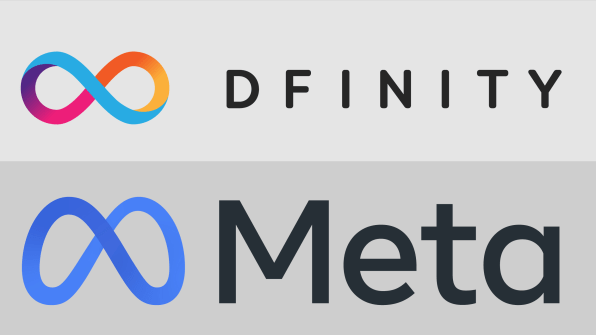Meta faces lawsuit over logo
As if Meta doesn’t have enough problems, the company now faces a lawsuit over its logo.
The Swiss blockchain nonprofit Dfinity filed suit against Meta for trademark infringement in a Northern California court this week. The suit alleges that Meta’s logo, an infinity symbol unveiled last fall when the company rebranded from “Facebook,” looks strikingly similar to Dfinity’s own mark. Dfinity is suing for unspecified damages and asking the court to prevent Meta from using the logo, claiming that its reputation is at stake. “Dfinity would be severely harmed in its development of the Internet Computer and its ability to attract users if those users were to associate Dfinity with Meta’s sordid online privacy history,” the complaint reads.

Could Meta be forced to pull its logo? According to legal experts we spoke with, it’s possible but not likely. The case rests on whether consumers find the two logos confusing. “I don’t see a strong likelihood of confusion, so I don’t believe this is a strong case,” says Alexandra J. Roberts, a professor at the University of New Hampshire Franklin Pierce School of Law. “But it’s impossible to rule out that Dfinity could be successful here.”
A key issue is that infinity symbols are fairly commonplace. The two logos might be similar in shape and design, but they’re still just stylized versions of an everyday symbol. That makes it harder to argue that consumers associate the symbol with a particular company. “It is the name ‘Dfinity’ that is likely the most distinctive part of Dfinity’s registered trademark,” says Jon J. Lee, an associate professor at the University of Oklahoma College of Law. “Had Meta adopted a similar name, such as Sfinity, for its brand, that would have made for a stronger claim of infringement.”
But even if Dfinity fails to prove its case, the lawsuit could jeopardize Meta’s attempts to earn trademark protection for its own logo. That’s because it could highlight how unremarkable the logo really is. (Meta filed for trademark protection in March.) Says Lee: “The U.S. Patent and Trademark Office might find that [Meta’s logo] is not inherently distinctive on its own and require more evidence that consumers associate the symbol with a single company.”
Neither Dfinity nor Meta responded to a request for comment by publication time.
(41)


